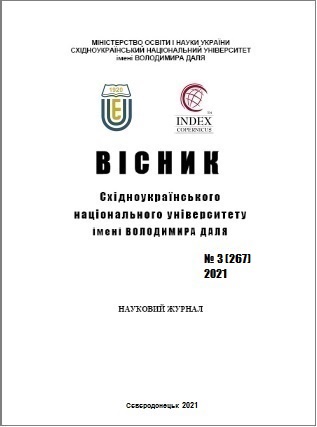Sustainable development of the region's ecosystem: essence and support problems
DOI:
https://doi.org/10.33216/1998-7927-2021-267-3-7-12Keywords:
sustainable development, ecosystem, factor, institutional support, regionAbstract
The article examines the essence of the ecosystem of the region and the problems of its sustainable development support. In particular, different interpretations of the ecosystem are identified. The ecosystem approach is presented as the basis of the concept of sustainable development.
It is proposed to define the ecosystem of the region as a set of interdependent actors and factors coordinated to improve the social, ecological and economic condition of the region. The region's ecosystem has its own structure, which is defined in the paper. Each ecosystem is characterized by a specific set of characteristics, which determine the potential for ecosystem development, including resources, barriers and needs that distinguish ecosystems in different regions. The stakeholders within the ecosystem structure include public authorities and local governments, the private sector, the public sector, as well as educational institutions and research institutions. Each stakeholder has own functions, which contribute to sustainable development of the ecosystem. The components of the region's ecosystems meet the three dimensions of the sustainable development goals, the simultaneous implementation of which is of great importance.
There are a lot of factors, which influence the region's ecosystem development. The classification of these factors is presented in the article. The factors include internal and external, resource and regulatory, positive and negative impact etc. The possible manifestation of positive and negative impact of the factors on sustainable development of the region's ecosystem is examined. The factors specific to Luhansk oblast, which are connected with the negative impact of the armed conflict, are outlined.
The necessity to create the institutional support of sustainable development of region's ecosystem is defined. Such institutional support includes regulatory, organizational, managerial, financial, economic and information components. These components are realized within the legislative framework, organizational framework, civil society framework.
References
1. Tsili Staloho Rozvytku: Ukrayina. Natsionalʹna dopovidʹ. Ministerstvo ekonomichnoho rozvytku i torhivli Ukrayiny, 2017. URL: http://un.org.ua/images/SDGs_NationalReportUA_Web_1.pdf
2. Stratehiya rozvytku Luhansʹkoyi oblasti na 2021–2027 roky. 2020. URL: http://loga.gov.ua/sites/default/files/collections/strategiya_lugansk_2027_last.pdf
3. Onlayn kurs "Stalyy rozvytok: nova filosofiya myslennya". URL: https://vumonline.ua/course/sustainability-new-philosophy-of-thinking/
4. Ekosistemy. URL: https://sites.google.com/site/priroda970/ekosistemy
5. Konventsiya pro okhoronu biolohichnoho riznomanittya vid 1992 roku, ratyfikovano Zakonom N 257/94-VR vid29.11.94. URL: https://zakon.rada.gov.ua/laws/show/995_030#Text
6. Decisions adopted by the conference of the parties to the Convention on Biological Diversityatits Fifth Meeting. AnnexIII. Nairobi, 2000. 15–26 May. Р. 104. URL: https://www.cbd.int/doc/decisions/COP-05-dec-en.pdf
7. System of Environmental Economic Accounting 2012: Central Framework. Р. 313. URL: https://unstats.un.org/unsd/envaccounting/seeaRev/SEEA_CF_Final_en.pdf
8. Stam E, Spigel B., Entrepreneurial Ecosystems. Working Papers 16-13, Utrecht School of Economics. 2016.
9. Pidorycheva I., Shevtsova H., Antonyuk V., Shvets N., Pchelynska H. A Conceptual Framework for Developing of Regional Innovation Ecosystems. European Journal of Sustainable Development. 2020. Vol. 9, No 3. P. 626–640. DOI: 10.14207/ejsd.2020.v9n3p626
10. Autio E., Levie J. Management of Entrepreneurial Ecosystems. In The Wiley Handbook of Entrepreneurship (eds G. Ahmetoglu, T. Chamorro‐Premuzic, B. Klinger and T. Karcisky). 2017. https://doi.org/10.1002/9781118970812.ch19
11. Sussan F., Acs Z. J. The digital entrepreneurial ecosystem. Small Business Economics. 2017. vol. 49(1). P. 55-73.
12. FAO technical guidelines for responsible fisheries. Aquaculture development. URL: http://www.fao.org/docrep/013/i1750e/i1750e.pdf
13. Freeman J. H., Audia P. G. Community Ecology and the Sociology of Organizations. Annual Review of Sociology. 2008. № 32(1). DOI: 10.1146/annurev.soc.32.061604.123135
14. Cohen B. Sustainable valley entrepreneurial ecosystems. Business Strategy and the Environment. 2006. №15. P. 1-14. https://doi.org/10.1002/bse.428.
15. Hladka L. I., Tiotstso A. P. Faktory vplyvu na sotsialʹno-ekonomichnyy rozvytok rehioniv. Problemy materyalʹnoy kulʹtury – ekonomycheskye nauky. URL: http://dspace.nbuv.gov.ua/bitstream/handle/123456789/45714/08-Gladka.pdf?sequence=1
16. Bulʹda S. O. Faktory vplyvu na formuvannya i vykorystannya resursnoho potentsialu rehionu. Naukovi pratsi MAUP. 2011. Vyp. 3 (30). S. 97-102.
17. Vorontsov S. B., Burbela T. M. Suchasnyy stan ta problemy formuvannya pidkhodiv do zabezpechennya staloho rozvytku Ukrayiny. Natsionalʹnyy instytut stratehichnykh doslidzhenʹ. URL: https://niss.gov.ua/sites/default/files/2020-07/suchasnyi-stan-zabezbechennya-stalogo-rosvytku-ukrainy.pdf.

